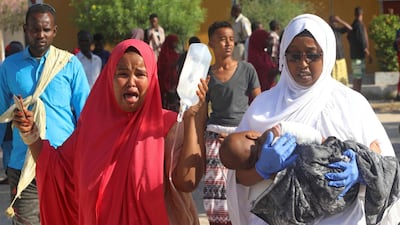On Saturday, Somalia’s capital Mogadishu was struck by its deadliest attack in years. A car bomb explosion in a busy area of the city killed at least 90 people, many of them students on their way to university. This gruesome attack is not an isolated incident yet Somalia’s woes rarely get the attention they deserve.
The nation has been battling the threat of Al Shabab, a group linked to Al Qaeda that has waged an insurgency against the central government and carried out attacks on civilians since its rise in 2004. For decades, ordinary Somalis have been unable to find a sense of normalcy as war, terrorism, endemic corruption, extreme poverty and even famine have plagued their daily lives amid global indifference.
Al Shabab’s influence might have declined in the past decade as it has, along with other extremist groups, sustained significant territorial losses. But Saturday’s attack has proven that it is far from beaten.
Despite increased US air strikes against its high-profile figures, Al Shabab continues to control large areas of land in Somalia’s south and centre. The terrorist group has been funding its activities by collecting so-called taxes through extortion and infiltrating government institutions, essentially stealing millions of dollars from Somalis each year.
In 2019 more than 200 people were killed in terrorist-linked attacks on Somalian soil, including Mogadishu mayor Abdirahman Omar Osman, who was killed in an Al Shabab suicide bombing in August, and Canadian-Somali journalist Hodan Nalayeh, who died in an attack by the extremist group in July.
When Somalia’s prime minister Hassan Ali Khiere, a political novice and humanitarian who promised to tackle high-level corruption, was appointed in February 2017, there were high hopes that the country would be able to extricate itself from its violent past. He has failed to live up to the promise, and struggled to develop relations in the region and internationally to help his country out of its troubles.
The same year, Al Shabab launched its deadliest attack ever, killing nearly 600 Somalis, many of whom burned to death in a storm of fire that erupted when a bomb-loaded lorry exploded next to a fuel tanker in Mogadishu. And this summer, the UN warned that the country was in dire need of aid to counter the looming threat of starvation.
Due to the gravity of the situation, there is little chance that the conflict-ridden country, one of the poorest in the world, can turn the page even in a matter of years given its long history of bad governance, violence and poverty.
Yet Somalia has largely been forgotten by the international community. The country attracted global attention and received support to end piracy off its coast in the early 2000s. At the time, pirates had threatened international maritime security around the Horn of Africa and in the Arabian Sea. An anti-piracy coalition comprising 25 nations had launched joint patrols in the area and by the end of the decade, this feat of international co-operation had succeeded in securing maritime lanes.
However, the impetus that drove wealthier nations to secure their commercial interests in Somalia is nowhere is to be seen when it comes to helping Mogadishu deal with its internal woes. While the threat of famine looms over the country, the UN said it was forced to cut back its life-saving activities in Somalia for lack of funding. And international peacekeeping forces are pulling out of the country at a time when terrorist attacks are on the rise. The numbers of UN and African Union peacekeeping troops have been steadily declining over the years as Somalian security forces are expected to take the place of the AU force by next year.
Somalia’s domestic political troubles, and the long shadow of extremists in the nation, do not bode well for a country that deserves peace and stability after decades of war and strife.

